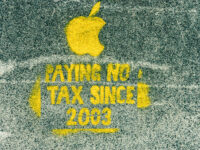Parliament adjourned for the summer last week, meaning both the House of Commons and Senate are largely on hold until mid-September. The Law Bytes podcast focuses intensively on Canadian legislative and digital policy developments and with another Parliamentary year in the books, this week’s episode takes a look back and take stock of where things stand. It features discussion on the implementation of the Internet streaming and news bills (C-11 and C-18) as well as an analysis of the current state of privacy, AI, online harms, and digital tax as found in Bills C-27, C-63, C-69, S-210 and C-27.
Post Tagged with: "dst"
Canadian Government Quietly Backs Down on its Implementation Plans for a Digital Services Tax
The federal government has quietly backed down from its plans to implement a new digital services tax as of January 2024 that the Parliamentary Budget Officer estimated would generate billions in revenue. It did not make the headlines or receive much promotion, but after months of insisting that a digital services tax would take effect in Canada in January 2024, the government has now removed that implementation deadline in the Fall Economic Statement. The battle over the proposed tax had sparked increasing anger between Canada and the U.S., with dozens of U.S. Senators and Representatives signing letters urging the government to delay its plans. The Canadian plan remains to establish a retroactive three percent tax that will hit a wide range of businesses, but given fears moving ahead now would jeopardize a global agreement that is designed to address the digital services tax issue, Canada has seemingly faced the obvious reality and backed down.
It’s Complicated: Unpacking the Risks Behind Canada’s Digital Services Tax Plan
The Canadian government released a detailed document last week outlining the specifics behind its draft Digital Services Tax Act. No actual legislation has yet been passed, but the government is providing guidance on how the potential law would be interpreted assuming it takes effect next year. The document has sparked criticism from business groups and the U.S. government given that it envisions a retroactive three percent tax that will hit a wide range of businesses. Further, the Canadian plan is facing significant opposition from many OECD countries since it may jeopardize a global agreement that is designed to address the digital services tax issue. While the digital services tax (DST) is typically framed as a tax on big tech, the reality is that the Canadian version extends far beyond just companies such as Google and Facebook, potentially including major Canadian retailers such as Canadian Tire, Loblaws, and others.
My view is that unlike Bills C-11 and C-18, which create cross-industry subsidy models funded by tech companies to support government policy, appropriate taxation models is the far better approach to ensure that companies “pay their fair share”. While a DST may be a good approach (particularly if part of a global system), the Canadian plan to implement the tax retroactively next year creates some significant risks. In fact, our current approach raises the prospect of U.S. tariff retaliation, opposition from many allies at the OECD, and expanded news link blocking in response to Bill C-18.
The Biden Visit to Canada: Why Digital Policy is Emerging as a Serious Trade Tension
The U.S. President Joe Biden’s visit to Ottawa this week has begun to place the spotlight on the mounting tensions over digital policy. For months, Canadian officials have not only been dismissive of the issue, but – as this week’s fishing expedition into Google and Facebook demonstrates – have not shied away from making the issue front and centre. I have been posting about trade-related risks with Canadian digital policy for months, noting that the risks are real and could result in billions in retaliatory tariffs that hits some of Canada’s most sensitive sectors. Indeed, this issue has been raised at every major meeting between senior trade officials for the past year. Is retaliation likely to happen? Certainly not immediately, but the longer the issues fester, the greater the impediment to advancing Canadian trade priorities. As Scottie Greenwood notes, “these are top-of-mind issues. They are not a small obscure issue.”
The Law Bytes Podcast, Episode 115: Reuven Avi-Yonah on the Past, Present and Future of Digital Services Taxes
There has been mounting concern over the past few years over whether some of the world’s largest companies – primarily big tech – pay their fair share of taxes. This issue has arisen in countries around the world leading to new digital services taxes that primarily target the U.S. tech giants and which in turn often leads to the U.S. threatening to retaliate in response. Canada now finds itself embroiled in these battles as Finance Minister Chrystia Freeland has proposed a retroactive digital services tax to take effect in 2024 if by that time a newly reached OECD agreement has not taken effect. Professor Reuven Avi-Yonah is a law professor at the University of Michigan and director of the school’s international tax LLM program. He joins the Law Bytes podcast to discuss digital services taxes, the OECD deal, and what might happen if the international agreement falls apart.











